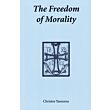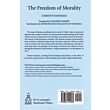The Freedom of Morality
Christos Yannaras
translated from the Greek by Elizabeth Brière
with a foreword by Bishop Kallistos of Diokleia
translated from the Greek by Elizabeth Brière
with a foreword by Bishop Kallistos of Diokleia
Publication Ddata: Crestwood, NY: St. Vladimir’s Seminary Press, 1984
Format: softcover
Number of Pages: 278
Dimensions (l × w × h): 21.6 cm × 14.0 cm × 1.7 cm
ISBN: 978‒0‒88141‒028‒0
Christos Yannaras
translated from the Greek by Elizabeth Brière
with a foreword by Bishop Kallistos of Diokleia
Number Three of Contemporary Greek Theologians
“‘The most tremendous thing granted to humanity is choice, freedom’: so writes Kierkegaard in his Journal, and such also is the central conviction that inspires this present book. Its theme is ‘the glorious liberty of the children of God‘ (Rom. 8:21)—a liberty only to be attained through asceticism. Christos Yannaras has not attempted to write a systematic treatise on ethics, for he believes that it is impossible, within a genuinely Orthodox context, to provide a ‘system’ of moral conduct. What he offers us is something different: an inquiry into the criteria and presuppositions which enable us to confront moral problems. And the most basic criterion of all, in his eyes, is freedom. He is passionately opposed to any understanding of Christian morality that views it primarily in juridical terms, as submission to a conventional legal code. Morality, as he sees it, is concerned not with rules but with persons—with persons in their freedom, persons in their mutual relationship. At its first publication in Greece in 1970, this book had a startling and even explosive impact. It is, however, a book that speaks to all of us in the West, whether Orthodox or not.”
—“Foreword”
CONTENTS
FOREWORD
CHAPTER ONE
THE MASKS OF MORALITY AND THE ETHOS OF THE PERSON
1. Authoritative ethics and conventional ethics
2. The morality of man and the being of man
3. The freedom of morality
4. The ethos of trinitarian communion
5. The ethos of man “in the image” of God
6. Person and individual
7. Ignorance of the truth of the person and the legalistic understanding of morality
CHAPTER TWO
SIN: EXISTENTIAL FAILURE AND “MISSING THE MARK”
1. The fall from life to survival
2. The perpetuation of the fall
3. Existential “alteration” of nature
4. “Beyond good and evil”
5. The psychological guilt complex
6. The dynamics of repentance
7. Studying freedom
8. The encounter between freedom and love
9. The “gospel” of hope
CHAPTER THREE
THE GOSPEL’S REJECTION OF INDIVIDUAL ETHICS
1. Holy Scripture and the fact of the Church
2. “A new creation in Christ”
3. The Law as a manifestation of truth and a path of life
4. Love, the fulfilling of the Law
5. The Gospel’s reversal of conventional values
6. Rebirth and moral restraints
CHAPTER FOUR
A HISTORICAL EXAMPLE: THE CHALLENGE OF THE “FOOLS FOR CHRIST”
1. Mockery of the world
2. Taking on another’s guilt
3. Complete abandonment of the ego
4. Freedom without bounds
CHAPTER FIVE
THE MORALITY OF THE CHURCH—A LITURGICAL ETHOS
1. Faithfulness to reality
2. The manifestation of the truth of God in human morality
3. The liturgical gathering of those that were scattered
4. The realization of the New Covenant in the eucharist
5. The cosmological dimension of the liturgical ethos
CHAPTER SIX
THE KINGLY, PRIESTLY AND PROPHETIC ETHOS OF THE EUCHARIST
1. The dynamics of the eucharist
2. Eucharistic use of the world
3. The world “made word”
4. Tangible experience of salvation
5. The kingly ethos
6. The priestly ethos
7. The liturgical celebration of life and the distinction between the sexes
8. The prophetic ethos
9. The “festival of the firstborn”
CHAPTER SEVEN
THE ASCETICISM OF THE CHURCH AND INDIVIDUAL VIRTUE
1. Asceticism, an ecclesial way
2. Rejection of dualism
3. Rejection of individuality
4. Unattainable by nature, yet attainable by grace
5. Neglect of asceticism, an alienation of the truth
6. “Bodily knowledge”
CHAPTER EIGHT
PIETISM AS AN ECCLESIOLOGICAL HERESY
1. The historical coordinates
2. The theological coordinates
3. The moral alienation of salvation
4. The moral assimilation of heresies
5. The individualistic “culture” of pietism
CHAPTER NINE
THE ETHICAL CHARACTER OF THE MYSTERIES
1. Fulness of life in the mysteries
2. The baptismal birth
3. The unction of royal adoption
4. Personal realization of the transformation in our nature
5. Repentance, the transformation of death into resurrection
6. The juridical alienation of repentance
7. The ministry of spiritual fatherhood
8. Marriage and the “loving power” in nature
9. The mystery of true eros
10. The ascetic character of marriage
11. The crisis in the institution of marriage
CHAPTER TEN
THE CHURCH CANONS AND THE LIMITS SET TO LIFE
1. The Church and the law
2. The canon of martyrdom and the witness of the canons
3. The canon of ascesis and the ascetism of the canons
4. The distinction between natural perpetuation and personal regeneration
5. The legalistic interpretation of the canons
6. The codification of the canons
CHAPTER ELEVEN
THE HISTORICAL AND SOCIAL DIMENSIONS OF THE CHURCH’S ETHOS
1. The problem of moral “efficacity”
2. The moral inadequacy of individual virtue
3. The totalitarian dimension of objective ethics
4. Visions of “general happiness” and their cost
5. The ontological fact of communion and its existential realization
6. The communal dynamics of repentance
7. The eucharistic starting-point for transformations in society
8. The communal ethos of the eucharist and its cultural expression
9. The sole program—reconstruction of the parish
CHAPTER TWELVE
THE ETHOS OF LITURGICAL ART
1. Worship, art and technology
2. The asceticism of art and the art of ascesis
3. The ethos of ancient Greek and Gothic architecture
4. The ethos of technology in Byzantine building
5. Religious “naturalism”
6. The “passage” to the hypostasis of the person through iconography
7. The last hope
EPILOGUE
THE MORALITY OF FREEDOM
INDEX
Format: softcover
Number of Pages: 278
Dimensions (l × w × h): 21.6 cm × 14.0 cm × 1.7 cm
ISBN: 978‒0‒88141‒028‒0
Christos Yannaras
translated from the Greek by Elizabeth Brière
with a foreword by Bishop Kallistos of Diokleia
Number Three of Contemporary Greek Theologians
“‘The most tremendous thing granted to humanity is choice, freedom’: so writes Kierkegaard in his Journal, and such also is the central conviction that inspires this present book. Its theme is ‘the glorious liberty of the children of God‘ (Rom. 8:21)—a liberty only to be attained through asceticism. Christos Yannaras has not attempted to write a systematic treatise on ethics, for he believes that it is impossible, within a genuinely Orthodox context, to provide a ‘system’ of moral conduct. What he offers us is something different: an inquiry into the criteria and presuppositions which enable us to confront moral problems. And the most basic criterion of all, in his eyes, is freedom. He is passionately opposed to any understanding of Christian morality that views it primarily in juridical terms, as submission to a conventional legal code. Morality, as he sees it, is concerned not with rules but with persons—with persons in their freedom, persons in their mutual relationship. At its first publication in Greece in 1970, this book had a startling and even explosive impact. It is, however, a book that speaks to all of us in the West, whether Orthodox or not.”
—“Foreword”
CONTENTS
FOREWORD
CHAPTER ONE
THE MASKS OF MORALITY AND THE ETHOS OF THE PERSON
1. Authoritative ethics and conventional ethics
2. The morality of man and the being of man
3. The freedom of morality
4. The ethos of trinitarian communion
5. The ethos of man “in the image” of God
6. Person and individual
7. Ignorance of the truth of the person and the legalistic understanding of morality
CHAPTER TWO
SIN: EXISTENTIAL FAILURE AND “MISSING THE MARK”
1. The fall from life to survival
2. The perpetuation of the fall
3. Existential “alteration” of nature
4. “Beyond good and evil”
5. The psychological guilt complex
6. The dynamics of repentance
7. Studying freedom
8. The encounter between freedom and love
9. The “gospel” of hope
CHAPTER THREE
THE GOSPEL’S REJECTION OF INDIVIDUAL ETHICS
1. Holy Scripture and the fact of the Church
2. “A new creation in Christ”
3. The Law as a manifestation of truth and a path of life
4. Love, the fulfilling of the Law
5. The Gospel’s reversal of conventional values
6. Rebirth and moral restraints
CHAPTER FOUR
A HISTORICAL EXAMPLE: THE CHALLENGE OF THE “FOOLS FOR CHRIST”
1. Mockery of the world
2. Taking on another’s guilt
3. Complete abandonment of the ego
4. Freedom without bounds
CHAPTER FIVE
THE MORALITY OF THE CHURCH—A LITURGICAL ETHOS
1. Faithfulness to reality
2. The manifestation of the truth of God in human morality
3. The liturgical gathering of those that were scattered
4. The realization of the New Covenant in the eucharist
5. The cosmological dimension of the liturgical ethos
CHAPTER SIX
THE KINGLY, PRIESTLY AND PROPHETIC ETHOS OF THE EUCHARIST
1. The dynamics of the eucharist
2. Eucharistic use of the world
3. The world “made word”
4. Tangible experience of salvation
5. The kingly ethos
6. The priestly ethos
7. The liturgical celebration of life and the distinction between the sexes
8. The prophetic ethos
9. The “festival of the firstborn”
CHAPTER SEVEN
THE ASCETICISM OF THE CHURCH AND INDIVIDUAL VIRTUE
1. Asceticism, an ecclesial way
2. Rejection of dualism
3. Rejection of individuality
4. Unattainable by nature, yet attainable by grace
5. Neglect of asceticism, an alienation of the truth
6. “Bodily knowledge”
CHAPTER EIGHT
PIETISM AS AN ECCLESIOLOGICAL HERESY
1. The historical coordinates
2. The theological coordinates
3. The moral alienation of salvation
4. The moral assimilation of heresies
5. The individualistic “culture” of pietism
CHAPTER NINE
THE ETHICAL CHARACTER OF THE MYSTERIES
1. Fulness of life in the mysteries
2. The baptismal birth
3. The unction of royal adoption
4. Personal realization of the transformation in our nature
5. Repentance, the transformation of death into resurrection
6. The juridical alienation of repentance
7. The ministry of spiritual fatherhood
8. Marriage and the “loving power” in nature
9. The mystery of true eros
10. The ascetic character of marriage
11. The crisis in the institution of marriage
CHAPTER TEN
THE CHURCH CANONS AND THE LIMITS SET TO LIFE
1. The Church and the law
2. The canon of martyrdom and the witness of the canons
3. The canon of ascesis and the ascetism of the canons
4. The distinction between natural perpetuation and personal regeneration
5. The legalistic interpretation of the canons
6. The codification of the canons
CHAPTER ELEVEN
THE HISTORICAL AND SOCIAL DIMENSIONS OF THE CHURCH’S ETHOS
1. The problem of moral “efficacity”
2. The moral inadequacy of individual virtue
3. The totalitarian dimension of objective ethics
4. Visions of “general happiness” and their cost
5. The ontological fact of communion and its existential realization
6. The communal dynamics of repentance
7. The eucharistic starting-point for transformations in society
8. The communal ethos of the eucharist and its cultural expression
9. The sole program—reconstruction of the parish
CHAPTER TWELVE
THE ETHOS OF LITURGICAL ART
1. Worship, art and technology
2. The asceticism of art and the art of ascesis
3. The ethos of ancient Greek and Gothic architecture
4. The ethos of technology in Byzantine building
5. Religious “naturalism”
6. The “passage” to the hypostasis of the person through iconography
7. The last hope
EPILOGUE
THE MORALITY OF FREEDOM
INDEX
Write Your Own Review






